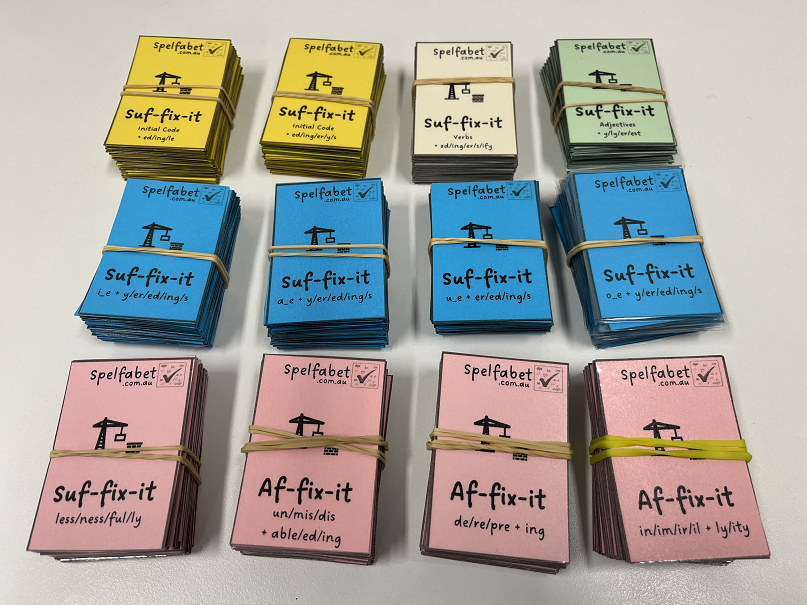Free & cheap word-building games
4 Replies
It’s the silly season, time to play more games. Excellent Spelfabet Speech Pathologists Georgina Ryan and Elle Holloway have devised and tested a set of download-and-print word-building card games which are now available in the Spelfabet shop. Each game can be printed on 3 sheets of A4 cardboard and handed to a group of kids to cut up and play, or you can laminate them first, if you want them to last.
The simplest game is free, and requires learners to add productive suffixes -ed and -ing, and Olden Days suffix -le (not used to produce new words any more, but still in heaps of words), to base words with ‘short’ vowels, adjacent consonants and the consonant spellings ss, sh, ck, ng, and tch. Here’s a video of how to play it:
Here’s a video of the other Initial Code game in the set, in which players add the suffixes -ed, -ing, -er, -y and -s/es to base words, doubling final consonants if required. If they have both -y and -er suffixes, they can stack these to create words like ‘bumpier’ and ‘jumpier’, changing -y into i before adding the -er.
Here are videos of two other games in the set, we hope this gives you the idea of how they work, and that they will work well with your learners. The whole set is available here. Happy silly season from all of us at Spelfabet!



Every word is a base or a base with something else (another base or affix). Is paddle a base or a base with an le suffix? How about bubble, rattle, trickle…. How can you tell?
Is ‘trickle’ formed trick + le —> trickle?
Is ‘gaggle’ formed by gag (g) + le —> gaggle?
I can’t see morphological or etymological relatives of these words to justify these constructions.
Checking etymonline, there is a noun paddle and three verbs paddle. The noun comes from padell “small, long-handled spade used to remove earth adhering to a plow, probably from Medieval Latin padela. Two of the three verbs have a similar etymology (paddle a canoe, paddle a carpet or naughty child (hopefully archaic). Only paddle in shallow water (meaning to walk in shallow water) seems to be formed using the suffix le because that verb comes from Middle Dutch paden “walk along a path, make a path,” from pad, pat “path”. It seems the paddle used to propel a canoe is not formed from the base ‘pad’ + the suffix ‘le’ but the verb paddle ( walk in shallow water for pleasure) or noun (Ruth enjoyed her paddle in the in the puddle.)
Using the game to generate a discussion in a group of students with a solid SWI background could be interesting.
‘scribble’.
https://youtu.be/ey3xB-PkeyY?si=ZhXn0h6Z0LLcr8-3
Hi John, of course you’re right, -le is not a productive suffix in English any more, but my colleagues who made up the game were wanting to stick to simple endings that could be added to words to help kids learn when to double final consonants. I think they couldn’t find enough other endings at the right level to make the game work. The aim is spelling skills, not etymological knowledge. Maybe I will put a disclaimer on it that says we know that -le is not a suffix any more, but we needed to include it to make the game work. We beg your forgiveness and indulgence, I’m pretty sure this is the only non-Modern-English suffix in the set. Alison
To teach effectively, it helps to build an understanding of how etymology, morphology and phonology interact to produce English spellings.
Teaching students what a suffix is seems to be in a terrible state of confusion. The Australian Curriculum defines a suffix as “A meaningful element added to the end of a word to change its meaning (for example, to show its tense : ‘-ed’ in ‘passed’). Common suffixes are ‘-ing’; ‘-ed’; ‘-ness’; ‘-less’; ‘-able’ . The Australian Curriculum defines a syllable as “A unit of sound within a word (for example, ‘bat’ has one syllable; ‘bat-ting has two syllables).” However, there are phonics and spelling programs which teach ‘-tion’ ‘-ssion’ etc as suffixes, that conflate the concepts suffix and syllable. It is difficult to have a conversation when teachers can’t agree on the meaning of core terminology. I think this game contributes to the confusion by not being clear about the difference between a syllable and a suffix.
There are so many words that can be used to teach students about when to double final consonant without resorting to words that do not contain a suffix. For example, in padded, stopped and hopped, the ed is a suffix and the final consonant is doubled. The le in the common meaning of paddle, gaggle or trickle is not an unproductive suffix. ‘le’ was never an ending that was added to the word pad, gag or trick to form paddle (as in oar), gaggle or trickle. It is important that students learn how to see when a string of letters is a suffix and when it isn’t. (Wing, walking, sing, singing). Students can learn how to tell if words belong in a morphological word family or not. (Scribbled, Scribed and Scripted)
Dr Tessa Daffern explained that there had to be a lot of professional development for Canberrean teachers so they could provide spelling intervention because their linguistic knowledge was “quite um low and so I needed to ensure that the teachers had that linguistic knowledge so that they knew how to explicitly teach…”
https://youtu.be/ComEHVhXbHg?si=EA9aR7O7tifojTQE
To clarify:
This link follows from the previous post. Scribble is not scribe with an le suffix added.
“ Student-made matrices, after researching the Latin roots, reflect their understandings of related words around the free base elements ‘script’, ‘scribe’ and ‘scribble’ derived from the Latin root scribere ~scriptum: write, draw,make lines”
https://wordinquiry.wordpress.com/2016/12/11/of-books-and-ink-dabblers/